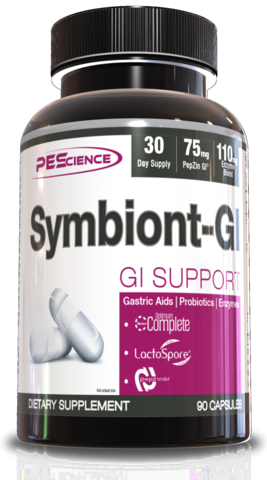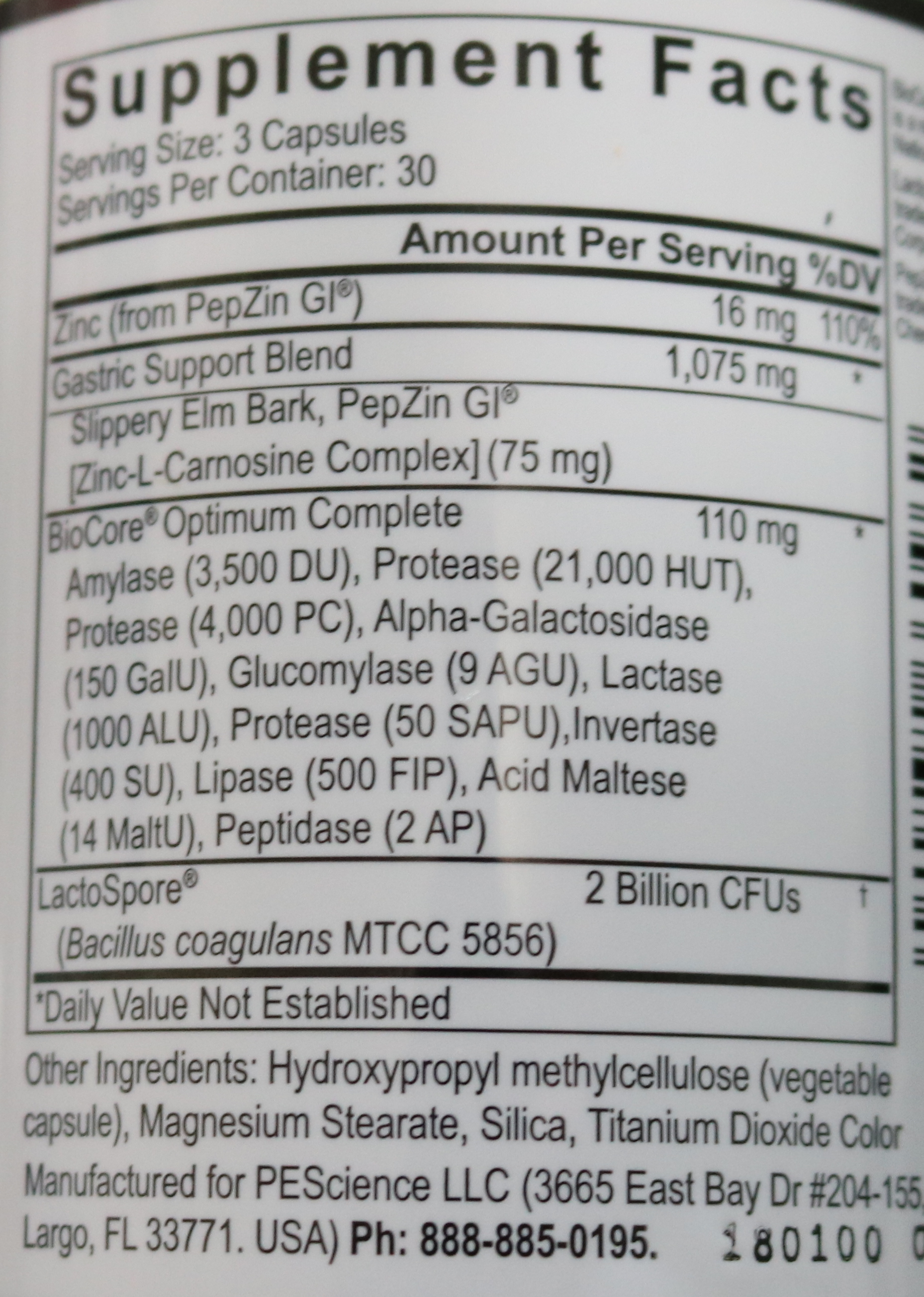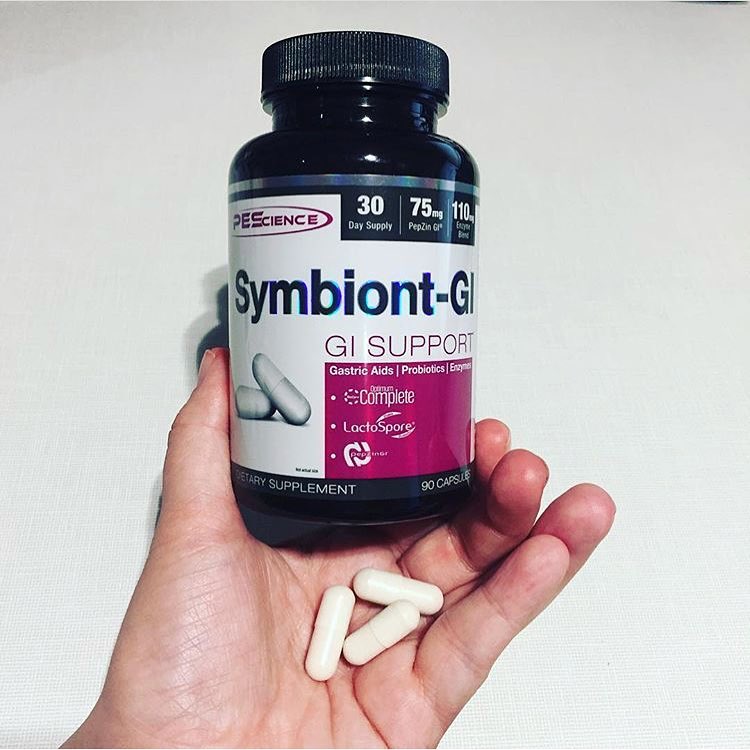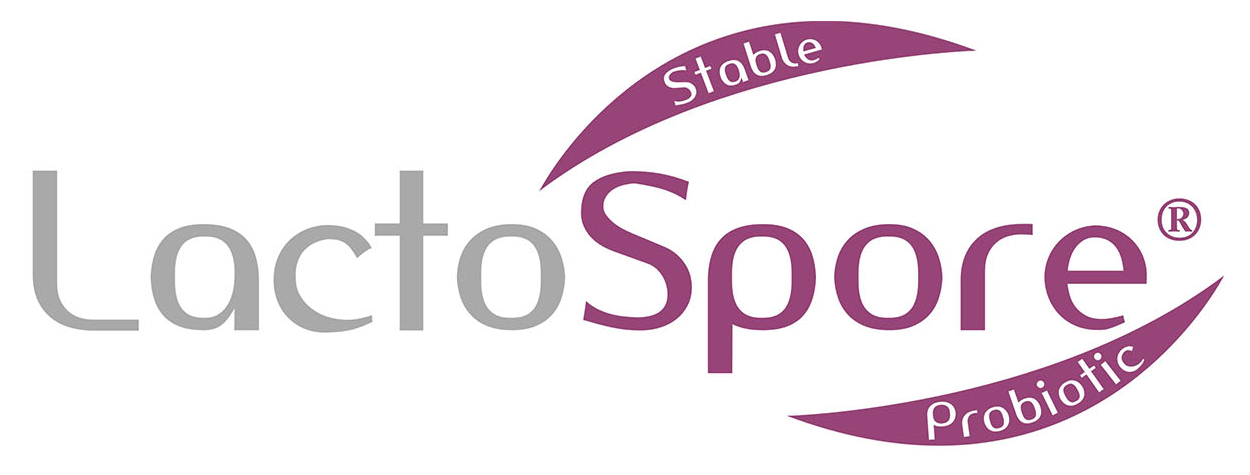In 2018, the gut is king. Poor gut health is linked to a new terrifying prognosis almost by the day. Depression, acne, digestive upset, and even chronic stress can arise from unhealthy gut microbiota. The abundance of inflammatory foods, toxic pesticides, and artificial colors and sweeteners have wreaked havoc upon our collective gut microbomes, and this has forged a whole new area of research and market of products meant to help fix the problem.

PEScience steps away from sports nutrition to bring symbiosis to your gastrointestinal system with Symbiont-GI, a brilliantly formulated GI support supplement
PEScience, most commonly known for their incredible protein products (as in Select Protein, Vegan Select Protein, and Select Protein Bars) as well as workout supplements (such as the Alphamine "athlete's energy drink") has tackled this issue with an exciting new product: Symbiont-GI.
This unique and well-rounded supplement hits many angles for several different types of "digestive sufferers":
- Gastric Aids
- Probiotics
- Digestive Enzymes
- Several Patented/Trademarked Ingredients (PepZin GI, Optimum Complete, LactoSpore)
This is unlike any of their other products, but it may in fact be the most truly beneficial one to those who really need it. However, is it good enough to bring balance -- or symbiosis -- to the gut!?
We have all the deals below, but first you can check PricePlow's coupon-powered prices and sign up for PEScience news alerts because this brand has been on absolute fire lately, and you won't want to miss what's coming next:
PEScience Symbiont-GI – Deals and Price Drop Alerts
Get Price Alerts
No spam, no scams.
Disclosure: PricePlow relies on pricing from stores with which we have a business relationship. We work hard to keep pricing current, but you may find a better offer.
Posts are sponsored in part by the retailers and/or brands listed on this page.
The Backstory
The history of this supplement is selfish. Symbiont-GI arose as a personal supplement, as PEScience's formulators devised it for their own digestion issues. However, it was so successful for their GI issues that they had to release it to the marketplace. Now that it's been a couple of months since its release, we're told that it's been working so well that PEScience's customer support team are receiving all kinds of fun success stories from happy customers.
Symbiont-GI is an aggressive, full-spectrum supplement since they're not targeting a specific gut condition. Instead, they're focusing on general gut health, but with many ingredients that target a few specific conditions (like ulcers and IBS). While the research on gut health is still in its infancy, there are ingredients that certainly have promise.
Knowing PEScience, they've likely done a serious amount of homework on the current gut-health literature. We can talk all we want about how good this is in theory, but where does the current research land? Let's analyze each ingredient specifically:
Symbiont-GI Ingredients

Symbiont-GI covers a lot of bases, but first we need to discuss why they need such a powerful form of zinc!
-
Gastric Support Complex:
-
Zinc as PepZinGI (75mg)
PepZinGi is one of the most expensive forms of zinc ever produced. Structurally, it's a novel crystalline chelated compound complex comprising of L-carnosine (N-β-alanyl-L-histidine) and zinc.[1] While zinc supplementation itself is already healthy, including a chelated form of zinc may allow it to interact with the cells of the stomach lining. This is likely due to including L-carnosine slowing down the dissociation of zinc in the stomach.[2] Quite a brilliant ingredient.
The zinc carnosine complex research
L-carnosine and zinc are already potent gut-health compounds. Zinc and l-carnosine supplements known for their antioxidant, membrane health, immune-system boosting, and even their tissue repairing effects.[3,4] They're also superb at destroying ulcers and preventing them. PepZin GI has research showing it may stick to ulcers much longer than either zinc or l-carnosine alone. Better yet, it's safe under harsh clinical scrutiny... and we mean a lot of clinical scrutiny.[5-7]
Great general health improvements
When we get away from even just gut health, PepZinGI provides insane health marker improvements. It has been shown to help muscular dystrophy, wound healing, hepatitis, and even sensory disorders![8-11] Zinc and l-caronsine together are also potent anti-aging ingredients, mostly due to a strong inhibition of the glycation process.[12]
The best form of zinc? Very possible, but we need more data
We're big on chelated minerals lately, and PepZin GI is potentially the best form of zinc on the market, specifically designed for GI issues
So all of this sounds great, right? The main selling point of this ingredients are great, but when you look at the mechanism... it could just be a fancy form of zinc. Does it have much advantages over zinc supplementation itself? The current literature hasn't compared the two just yet. While PepZinGI compares well against a control drug... we haven't seen it compared to just elemental zinc!
In addition, most of the great studies on zinc-carnosine are animal-based.
So for now, we can't yet call PepZinGI a "holy grail" until a zinc comparison goes down. But for now, it's very promising, and anyone with gut health issues should really look into this research and ask if they need more zinc in their life. And if you do -- then why not get a high-quality, chelated form like this one?
When we see expensive ingredients like this, we know that the brand means business. Anyone who's ever had digestive issues or ulcers knows that they want the absolute very best as soon as possible, and right now, PepZinGI seems to be it in terms of a zinc / carnosine complex.
-
Slippery Elm Bark (1,000mg)
Slippery Elm Bark is an ingredient we don't get to see at play often. Known as the "oldest stomach soothing herb" around, slippery elm bark should complement the PepZinGI present in Symbiont-GI well. The benefits from slippery elm bark likely come from its mucilage content. Regardless, supplementation should help those that suffer from IBS and constipation reliably.[13]
The research on slippery elm bark is shallow, however. It's a unique inclusion, and even just one successful IBS / constipation study is enough for any sufferer to give it a shot. PEScience inspires copycats, so maybe research will pop up as the ingredient is used more often.
As we can already see, this is a multi-faceted product that's covering a slew of common digestive issues.
-
-
Biocore Optimal Complete (110mg)
Biocore Optimal Complete is a trademarked digestive enzyme complex. Allegedly designed by GI experts, the complex contains the usual suspects of the digestive enzyme world along with some welcome extras you may not have tried before.
For instance, alpha-galactosidase supplementation is good at reducing gas produced by wheat and vegetable consumption.[14] Our collective issues with wheat have only gotten worse over time (is it the wheat getting worse, or us? Or both?!)... so this is an ingredient nearly anyone should look into, unless you've already ditched wheat completely, which is always a smart move on the GI front these days.
And if you're reading this, gas is probably a part of the problem, causing some serious social distortion amongst your friends and family. Any amount of help to curb our gas production is a welcome addition to our lives. To top that off, PEScience even threw in lactase, which is a great bonus for those that suffer from milk sugar sensitivities (lactase breaks down the milk sugar lactose).[15]
A well-rounded blend
Meanwhile, there are several other ingredients, such as amylase (for breaking down starches), protease (for breaking down proteins - this includes the peptidase ingredient), lipase (for hydrolyzing fats), and getting back to the carbs, we have invertase to digest sucrose (table sugar), glucomylase (breaks starches down to simpler sugars like amylase does), as well as acid maltase to assist with glycogen.
As far as we can tell, there's no research on Bioscore Optimal in its current form, but we've covered the research on these individual ingredients and they all play major roles - some more important than others depending on what you're not producing enough of. This is strictly a digestive enzyme complex, and it looks like a superb one.
The future is looking bright for these blends.[15] UMich, one of the best medical schools in the US, even recommends digestive enzyme supplementation for those suffering from gastrointestinal disorders. That's huge, and t the point that sufferers are silly to ignore supplements like these anymore.[16]
-
LactoSpore (2 Billion CFUs)
LactoSpore is a new and patented probiotic complex featuring Bacillus coagulans MTCC 5856. Probiotic supplementation has become huge the last few years. If bacteria in the gut is so important, we need to get the good bacteria to win the war. Research on probiotics is indeed in its infancy, but scientists have uncovered some amazing benefits. More recently, an article showed that probiotic supplementation can even have antidepressant and anti-anxiety effects on those that may suffer from such conditions![17] The gut is far more important than we ever wanted to believe!
Probiotics improve the functionality of the gut barrier, reduce symptoms of seasonal allergies, and even improve immune system health.[18-20]
What about LactoSpore specifically?
Lactospore itself has also been studied and bolstered impressive results. It's succeeded in two trials so far. The first trial showed that it's safe for consumption and the second illustrated it may provide digestive health benefits.[21,22]
Primarily,
B. coagulans MTCC 5856 at a dose of 2 × 109 cfu/day along with standard care of treatment was found to be safe and effective in diarrhea predominant IBS patients for 90 days of supplementation. Hence, B. coagulans MTCC 5856 could be a potential agent in the management of diarrhea predominant IBS patients.
So this one may take some time to "kick in", but the research for IBS patients is very promising!
While the other ingredients are for the "short game" of getting you going immediately, LactoSpore plays the long game in getting your gut healthy for the future, and this might make it the "best" ingredient of Symbiont-GI as a whole for your actual long-term health... but it's the aforementioned ingredients you'll be feeling success from earlier on.
PES goes on the record
After we published this analysis, PEScience wanted to add some commentary:
Symbiont-GI is one of our favorite creations. We made it for ourselves, and figured we'd share with the masses after everyone in the company saw such great results from it. Tons of people have GI issues but it's one of those things that's kept on the hush because it's an embarrassing topic. Now that people have been on Symbiont for a month plus, our CS team gets to hear all the lovely GI success stories! The reviews we have seen come into our website confirm the success people are having.
The goal of the product is an an all-around approach. The enzyme research is super fascinating. We were wanting an all around top-notch enzyme blend, and partnered with a company that are experts in digestive enzymes for the most complete blend. Since GI issues can be caused from a number of different things we wanted a well rounded product suitable for everyone.
"Symbiont-GI" was the name we went with because our goal was to make a product that could have everyone's GI tract working in symbiosis. From one end to the other, we want that intestinal flora to work its best.
--PEScience
Dosage

Three capsules a day for 90 days is the dose behind the LactoSpore research, and will keep you at 100% zinc needs!
Take 1-3 capsules daily, best with meals (we suggest "at first bite" to get the digestive enzymes ready to go sooner than later.
The max dosage of three capsules will make the bottle last a month, and that's probably the best way to start. If you've had success, you may be able to "cruise" with one or two capsules daily after that first month or two... but don't mess with success too much!
Conclusion: PEScience Attacking "Mainstream" Problems is "A Very Good Thing"(TM)
We love it when sports nutrition brands branch out and crush it in alternate markets where "normal" folks hang out. PEScience has some master formulators, and it shouldn't only be athletes who get to benefit from their brains.
Symbiont-GI has us excited for the future of gut health products. Only a few years ago, the research on probiotics and digestive enzyme products was "Mad Max" in nature. As the medical field realizes the importance of a healthy gut and enteric nervous system, we will see the dietary supplement industry take on this new frontier. For now, PEScience may rule supreme in the gut health arena with this product - and this is a brand that's not yet known in the "general health" realm. We'll take our sports nutrition experts against those from other market niches any day of the week.
Symbiont-GI is a triple threat: inexpensive, effective, and scientifically supported. At 25 dollars a bottle, we recommend that anyone with digestive issues... or hell, anyone at all, give this product a shot. You have nothing to lose but some bad gas.
PEScience Symbiont-GI – Deals and Price Drop Alerts
Get Price Alerts
No spam, no scams.
Disclosure: PricePlow relies on pricing from stores with which we have a business relationship. We work hard to keep pricing current, but you may find a better offer.
Posts are sponsored in part by the retailers and/or brands listed on this page.
References:
- Matsukura T, Takahashi T, Nishimura Y, Ohtani T, Sawada M, Shibata K. Characterization of crystalline L-carnosine Zn(II) complex (Z-103), a novel anti-gastric ulcer agent: tautomeric change of imidazole moiety upon complexation. Chemical & pharmaceutical bulletin. 1990; 38(11):3140-6; https://pubmed.ncbi.nlm.nih.gov/2085900
- Matsukura, T., & Tanaka, H. (2000, July). Applicability of zinc complex of L-carnosine for medical use; https://pubmed.ncbi.nlm.nih.gov/10951100
- Yamakawa, Akihiro. (1975). Effect of L-carnosine (N-2-M) on experimental gastric ulcer. 昭和医学会雑誌. 35. 113-126. 10.14930/jsma1939.35.113; https://www.researchgate.net/publication/311831269_Effect_of_L-carnosine_N-2-M_on_experimental_gastric_ulcer
- Cho, C. H. (1989). Current views of zinc as a gastrohepatic protective agent. Drug Development Research, 17(3), 185-197; https://onlinelibrary.wiley.com/doi/pdf/10.1002/ddr.430170302
- Yoshikawa T, Naito Y, Tanigawa T, Yoneta T, Kondo M. The antioxidant properties of a novel zinc-carnosine chelate compound, N-(3-aminopropionyl)-L-histidinato zinc. Biochimica et biophysica acta. 1991; 1115(1):15-22; https://pubmed.ncbi.nlm.nih.gov/1659910
- Cho, C., Luk, C., & Ogle, C. (1991). The membrane-stabilizing action of zinc carnosine (Z-103) in stress-induced gastric ulceration in rats. Life Sciences, 49(23); https://pubmed.ncbi.nlm.nih.gov/1943472
- Arakawa T, Satoh H, Nakamura A, et al. Effects of zinc L-carnosine on gastric mucosal and cell damage caused by ethanol in rats. Correlation with endogenous prostaglandin E2. Digestive diseases and sciences. 1990; 35(5):559-66; https://pubmed.ncbi.nlm.nih.gov/2331952
- W., W., H., K., O., M., S. (1998). Insulin-like growth factor I plays a role in gastric wound healing: Evidence using a zinc derivative, polaprezinc, and an in vitro rabbit wound repair model. Alimentary Pharmacology and Therapeutics, 12(11), 1131-1138; https://pubmed.ncbi.nlm.nih.gov/9845403
- Ikui, A; Ikeda M; Yoshikawa T; Kudo I; Onoda K; Kida A: Jibiinkou (1999), 92(7), 801-804.
- Takagi, H., Nagamine, T., Abe, T., Takayama, H., Sato, K., Otsuka, T., Mori, M. (2001). Zinc supplementation enhances the response to interferon therapy in patients with chronic hepatitis C. Journal of Viral Hepatitis, 8(5), 367-371; https://pubmed.ncbi.nlm.nih.gov/11555194
- Tameyasu, T., Yamada, M., Tanaka, M., & Takahashi, S. (2002). Effect of Zinc-Carnosine Chelate Compound on Muscle Function in Mdx Mouse. The Japanese Journal of Physiology, 52(1), 111-120; https://pubmed.ncbi.nlm.nih.gov/12047809
- Yuneva, M., Bulygina, E., Gallant, S., Kramarenko, G., Stvolinsky, S., Semyonova, M., & Boldyrev, A. (1999). Effect of Carnosine on Age-Induced Changes in Senescence-Accelerated Mice. Journal of Anti-Aging Medicine, 2(4), 337-342; https://www.liebertpub.com/doi/abs/10.1089/rej.1.1999.2.337
- Hawrelak, J. A., & Myers, S. P. (2010). Effects of Two Natural Medicine Formulations on Irritable Bowel Syndrome Symptoms: A Pilot Study. The Journal of Alternative and Complementary Medicine, 16(10), 1065-1071; https://pubmed.ncbi.nlm.nih.gov/20954962
- Di Stefano M, Miceli E, Gotti S, Missanelli A, Mazzocchi S, Corazza GR. The effect of oral alpha-galactosidase on intestinal gas production and gas-related symptoms. Digestive diseases and sciences. 2007; 52(1):78-83. https://pubmed.ncbi.nlm.nih.gov/17151807
- Ianiro, G., Pecere, S., Giorgio, V., Gasbarrini, A., & Cammarota, G. (2016). Digestive Enzyme Supplementation in Gastrointestinal Diseases. Current Drug Metabolism, 17(2), 187–193. https://doi.org/10.2174/138920021702160114150137
- Digestive Enzymes. (n.d.); https://www.uofmhealth.org/health-library/hn-2840008
- Steenbergen L, Sellaro R, van Hemert S, Bosch JA, Colzato LS. A randomized controlled trial to test the effect of multispecies probiotics on cognitive reactivity to sad mood. Brain, behavior, and immunity. 2015; 48:258-64; https://pubmed.ncbi.nlm.nih.gov/25862297
- Strasser, B., Geiger, D., Schauer, M., Gostner, J., Gatterer, H., Burtscher, M., & Fuchs, D. (2016). Probiotic Supplements Beneficially Affect Tryptophan–Kynurenine Metabolism and Reduce the Incidence of Upper Respiratory Tract Infections in Trained Athletes: A Randomized, Double-Blinded, Placebo-Controlled Trial. Nutrients, 8(11), 752; https://pubmed.ncbi.nlm.nih.gov/27886064
- Dennis-Wall JC, Culpepper T, Nieves C, et al. Probiotics ( KS-13, G9-1, and MM-2) improve rhinoconjunctivitis-specific quality of life in individuals with seasonal allergies: a double-blind, placebo-controlled, randomized trial. The American journal of clinical nutrition. 2017; 105(3):758-767. https://pubmed.ncbi.nlm.nih.gov/28228426
- Luyer, M. D., Buurman, W. A., Hadfoune, M., Speelmans, G., Knol, J., Jacobs, J. A., Greve, J. W. (2005). Strain-Specific Effects of Probiotics on Gut Barrier Integrity following Hemorrhagic Shock. Infection and Immunity; https://iai.asm.org/content/73/6/3686.full
- Majeed M, Nagabhushanam K, Natarajan S, et al. Bacillus coagulans MTCC 5856 supplementation in the management of diarrhea predominant Irritable Bowel Syndrome: a double blind randomized placebo controlled pilot clinical study. Nutrition journal. 2016; 15:21; https://pubmed.ncbi.nlm.nih.gov/26922379
- Balliett M, Burke JR. Changes in anthropometric measurements, body composition, blood pressure, lipid profile, and testosterone in patients participating in a low-energy dietary intervention. Journal of chiropractic medicine. 2013; 12(1):3-14; https://pubmed.ncbi.nlm.nih.gov/23997718







Comments and Discussion (Powered by the PricePlow Forum)